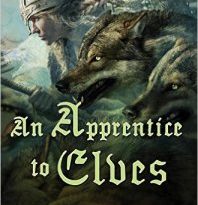Gary K. Wolfe Reviews The Red Scholar’s Wake by Aliette de Bodard
 The Red Scholar’s Wake, Aliette de Bodard (JABberwocky Literary Agency 9781625676108, $9.99, 258pp, eb) November 2022.
The Red Scholar’s Wake, Aliette de Bodard (JABberwocky Literary Agency 9781625676108, $9.99, 258pp, eb) November 2022.
In the past few years, Aliette de Bodard has been productively exploring different genres such as space opera (The Citadel of Weeping Pearls), fairy tales (In the Vanisher’s Palace) and mysteries (The Tea Master and the Detective, Seven of Infinities), so when she subtitles The Red Scholar’s Wake ‘‘a Xuya Universe Romance’’ we can reasonably expect some of the high passions, miscommunications, betrayals, heartbreaks, sex, and reconciliations that seem to be checkboxes of that genre, and de Bodard delivers on all of them. Plus, there are pirates. That adds a fillip of pirate-adventure romance, though little actual pirating goes on in the novel, which is set in de Bodard’s far future Xuya universe, in which Chinese and Vietnamese cultures had long ago become dominant. Instead, the focus is on a young woman named Xich Si, captured during a pirate raid by the mindship Rice Fish, who is herself mourning the death of her wife, the Red Scholar Huan. (The pirate alliance is organized into five ‘‘banners’’ according to color, and Huan was effectively the director of the Red Banner.) Xich Chi, also mourning the death of her shipmate and separation from her six-year-old daughter Khanh, is expecting to be tortured and executed, but instead Rice Fish, presenting herself as a glamorous avatar in flowing robes, surprises her by proposing marriage – ‘‘a business proposal… with no love involved.’’ Xich Chi will gain protection within the pirate alliance, and Rice Fish will solidify her position to possibly become the next Red Scholar.
We can see where this is going, and de Bodard knows it. Vast power differentials are a common characteristic of the sorts of relationships she writes about, and this might be the most extreme one yet, and the one which presents the most complex challenges. Rice Fish may be a legendary pirate and a formidable warship, but – like many mindships in SF from Anne McCaffrey on – she also has a vulnerable organic core in the most protected part of the ship, her ‘‘heartroom.’’ And, like most fictional pirates, she occupies that ambiguous moral ground between being a violent predator on the one hand, and on the other a liberator whose victims are mostly unsavory capitalists and imperialists. These issues aren’t addressed in any depth by de Bodard, but they serve to make Rice Fish a conflicted and not entirely sympathetic character, troubled not only by her endangered political status among the pirates, but by her estranged and openly hostile son Hô. (Hô is frustrated that pirate life has gotten dull: ‘‘We used to be feared. Our name used to mean something. Now… we’ve become bureaucrats.’’ He has a point.) As her relationship with Xich Si develops unexpectedly into an actual romance, she begins to question some of her long-held assumptions and even her idealized memory of her deceased wife, the Red Scholar. Xich Si, for her part, must come to terms with falling in love with the person she blames for killing her shipmate and placing her young daughter in jeopardy. It doesn’t help that she’s a spaceship.
While bringing together two such unlikely lovers seems to be one of the most common conventions of romance, de Bodard places the melodrama against the backdrop of flat-out space opera, which she excels at. The Citadel, the pirate alliance stronghold protected by a swarm of asteroids, comes under threat not only from a delicious villain named Kim Thông, but from a huge flotilla from the An O empire led by Censor Trúc, determined to wipe out the pirates once and for all. (de Bodard doesn’t provide much background about the politics of her Xuya universe, but pirates vs. the empire seems pretty self-explanatory.) The last third of the novel, with its space battles, navigational trickery, ship-boardings, sabotage, and desperate last-minute negotiations, is as colorful and satisfying as anything from the classic examples of the form. It may take a lot of fireworks to bring these two mismatched lovers to a degree of introspection and reconciliation, but then the fireworks have always been most of the fun.
Gary K. Wolfe is Emeritus Professor of Humanities at Roosevelt University and a reviewer for Locus magazine since 1991. His reviews have been collected in Soundings (BSFA Award 2006; Hugo nominee), Bearings (Hugo nominee 2011), and Sightings (2011), and his Evaporating Genres: Essays on Fantastic Literature (Wesleyan) received the Locus Award in 2012. Earlier books include The Known and the Unknown: The Iconography of Science Fiction (Eaton Award, 1981), Harlan Ellison: The Edge of Forever (with Ellen Weil, 2002), and David Lindsay (1982). For the Library of America, he edited American Science Fiction: Nine Classic Novels of the 1950s in 2012, with a similar set for the 1960s forthcoming. He has received the Pilgrim Award from the Science Fiction Research Association, the Distinguished Scholarship Award from the International Association for the Fantastic in the Arts, and a Special World Fantasy Award for criticism. His 24-lecture series How Great Science Fiction Works appeared from The Great Courses in 2016. He has received six Hugo nominations, two for his reviews collections and four for The Coode Street Podcast, which he has co-hosted with Jonathan Strahan for more than 300 episodes. He lives in Chicago.
This review and more like it in the January 2023 issue of Locus.
 While you are here, please take a moment to support Locus with a one-time or recurring donation. We rely on reader donations to keep the magazine and site going, and would like to keep the site paywall free, but WE NEED YOUR FINANCIAL SUPPORT to continue quality coverage of the science fiction and fantasy field.
While you are here, please take a moment to support Locus with a one-time or recurring donation. We rely on reader donations to keep the magazine and site going, and would like to keep the site paywall free, but WE NEED YOUR FINANCIAL SUPPORT to continue quality coverage of the science fiction and fantasy field.
©Locus Magazine. Copyrighted material may not be republished without permission of LSFF.






